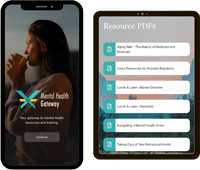Did you know that grief is not just the loss of a loved one? Grief encompasses the emotional and behavioral response to a significant life change. Grief has a significant impact on behavioral health, and although this is a universal experience that everyone will endure, grief’s impact on behavioral health affects individuals in different ways.
Generally, grief influences behavioral health due to the emotional response. Sorrow, regret, sadness, frustration, and relief are some of the emotions related to grief. Sometimes, the emotional distress of grief can lead to symptoms of depression, anxiety, and other mental health challenges. It’s not uncommon for individuals experiencing grief to require professional help. Let’s dive into some of the challenges that can be seen when considering behavioral health and grief.
Problem: Feeling Alone and Withdrawing from the World
Grieving individuals may withdraw from social interactions and process their emotions in private. Certain events or places can be a painful reminder of the loss, so individuals may avoid those scenarios. Isolation can become problematic for a grieving individual when it starts to have a negative impact on their overall well-being and daily functioning over a prolonged period.
Solution: Reconnecting and Finding Support
Balance is key here. Although it is normal to need some time alone, staying connected is crucial too. Reach out to a friend or a support group in your area.
Many people find that helping others through loss can be an integral part of their own healing journey. Visit our Support Group page for more information.
Problem: Mental Health Conditions Amplified by Grief
Although grief is universally difficult to process, those with pre-existing behavioral and mental health disorders will likely experience intensification of symptoms and may exhibit unique triggers and responses. In cases where the loss was sudden, unexpected, or traumatic, grief may be accompanied by symptoms of post-traumatic stress disorder (PTSD), which can further complicate the grieving process.
Solution: Navigating Complicated Grief with Care
If you’re in this boat, it’s a good idea to seek extra support. Talking to a mental health professional who understands both grief and your existing condition is crucial for your healing. To find a provider that fits your needs, call The Hope Line.
Problem: Substance Use as a Coping Mechanism
An individual’s behavioral health is severely affected when substances are utilized as a coping mechanism. This behavior puts those individuals at risk for developing substance use disorder. Turning to substances adds a new layer of complexity to the grieving process as substance use disorder has compounding mental and behavioral health consequences.
Solution: Find Healthier Options, or Connect with a Professional
If you are using substances to cope with the emotions of loss, the first step involves finding healthier alternatives to deal with the pain. This can include in engaging in activities that promote relaxation and well-being, joining a support group and seeking support from trusted friends and family members. If the substance use becomes problematic it is best that you speak to a mental health professional. Call the Hope Line to get connected with a provider that specialized in substance use.
National Resources
- SAMHSA National Helpline
- NIH – Coping with Traumatic Events
- CDC – Grief
- National Suicide & Crisis Lifeline
Find out more about Navigating Grief and its Impact on Behavioral Health and visit our resources page.


